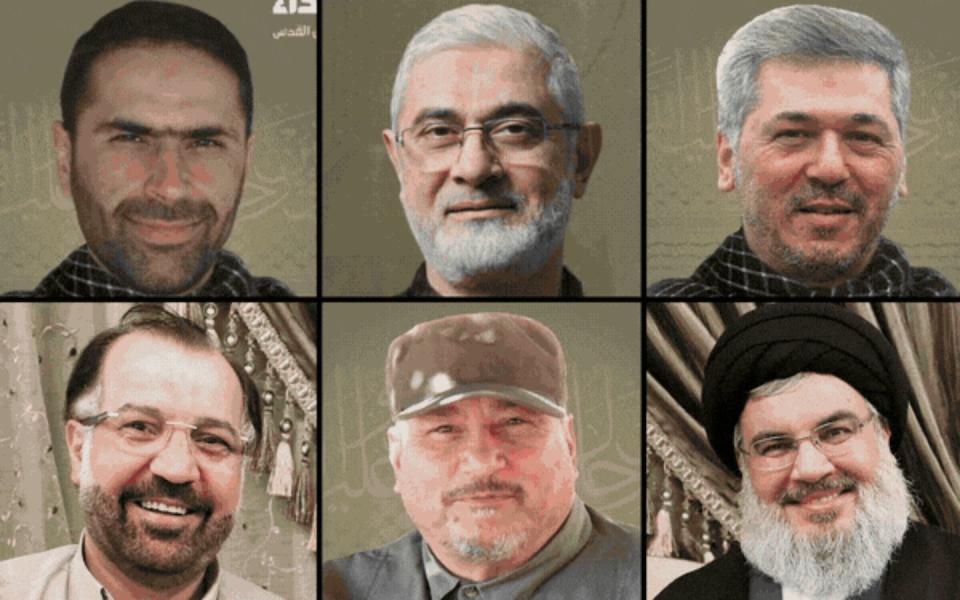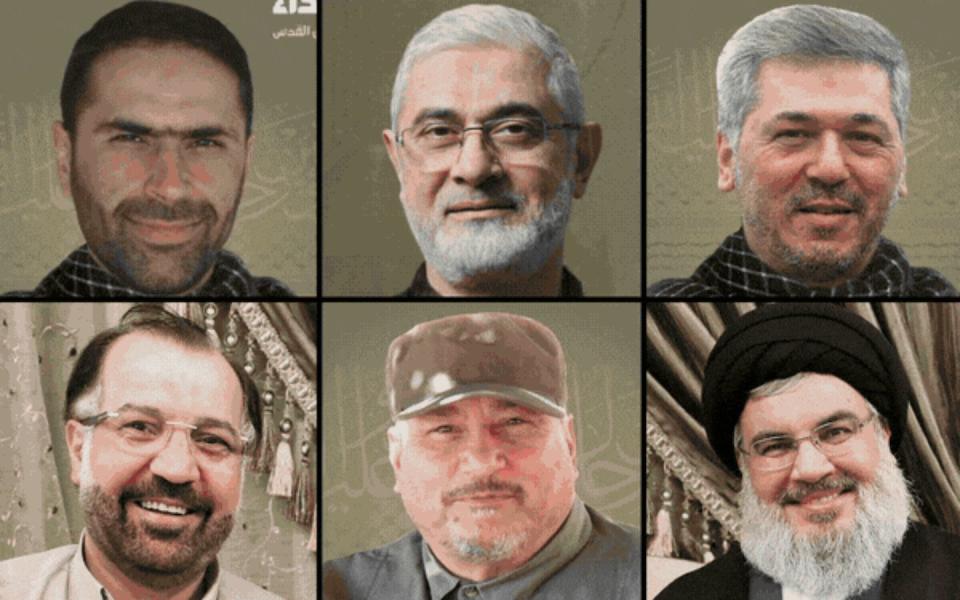
As huge air strikes levelled at least six buildings in the southern suburbs of Beirut, it became clear that Israel was targeting Hezbollah’s headquarters.
What was not clear in the aftermath was whether Hassan Nasrallah, the Hezbollah leader, was killed.
The huge bombing in Lebanon comes after a week of some of the most globally extensive air strikes of the 21st century, in what Israel has called Operation Northern Arrows – a campaign against Iran’s most formidable regional proxy.
The lead up to Friday’s attack was paved by a series of preliminary strikes to decapitate Hezbollah’s military leadership, cripple its subaltern class, destroy its ability to communicate meaningfully and spread panic through its ranks.
The synchronised sabotage of the group’s pagers last week caught the world’s attention, but by then Israeli forces had already embarked on an assassination operation to eliminate as many of Hezbollah’s high command as possible.
The first significant blow was struck in the summer when Fuad Shukr, the movement’s overall military leader, died in an air strike on southern Beirut, a stronghold of the terrorist group.
But arguably a more devastating strike came in September in another attack on the Lebanese capital that killed some 16 commanders of the Radwan Brigade, Hezbollah’s elite special forces unit, including Ibrahim Aqil, the overall leader of the unit.
And Israel does not seem finished yet. The IDF is now almost certainly attempting to kill the group’s overall leader Hassan Nasrallah.
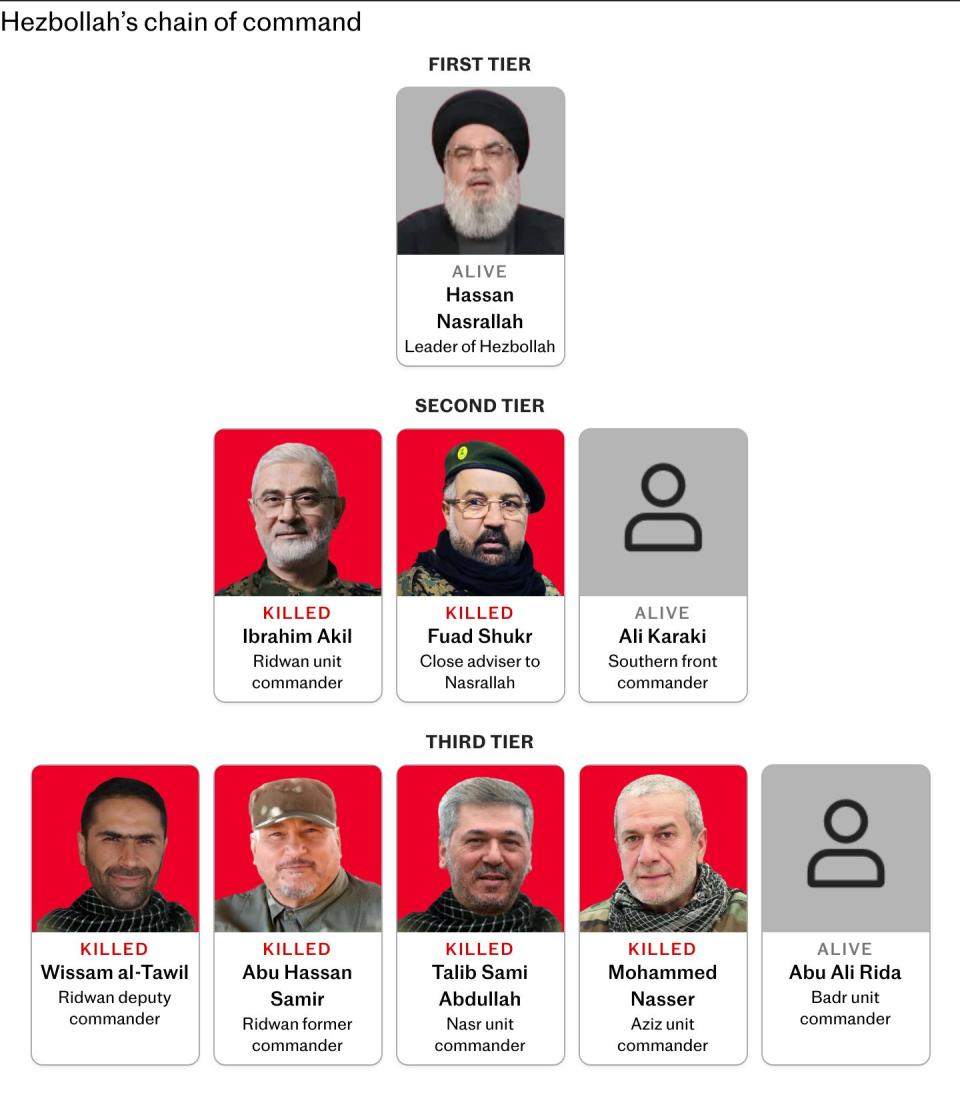
Over its four-decade history, Hezbollah has weathered a series of top-level assassinations.
Abbas al-Musawi, Nasrallah’s predecessor and the movement’s co-founder, who was killed along with his family when Israeli helicopters fired missiles at his motorcade in southern Lebanon in 1992, is one example.
But never have the killings come in such quick succession, notes Lina Khatib, an associate at the think tank Chatham House.
“This is definitely a heavier blow and it will have caused a degree of disarray within Hezbollah,” she said.
How Israel did it
Hezbollah’s senior military leaders are so secretive that they are known within the movement as “untraceable ghosts” – yet Israel seems to know exactly when and where they are meeting and how to strike them at will.
It is clear that the movement is heavily infiltrated, believes Hilal Khashan, a Hezbollah expert at the American University of Beirut.
“It is not just a question of infiltration by Israel – it is a question of infestation,” he says.
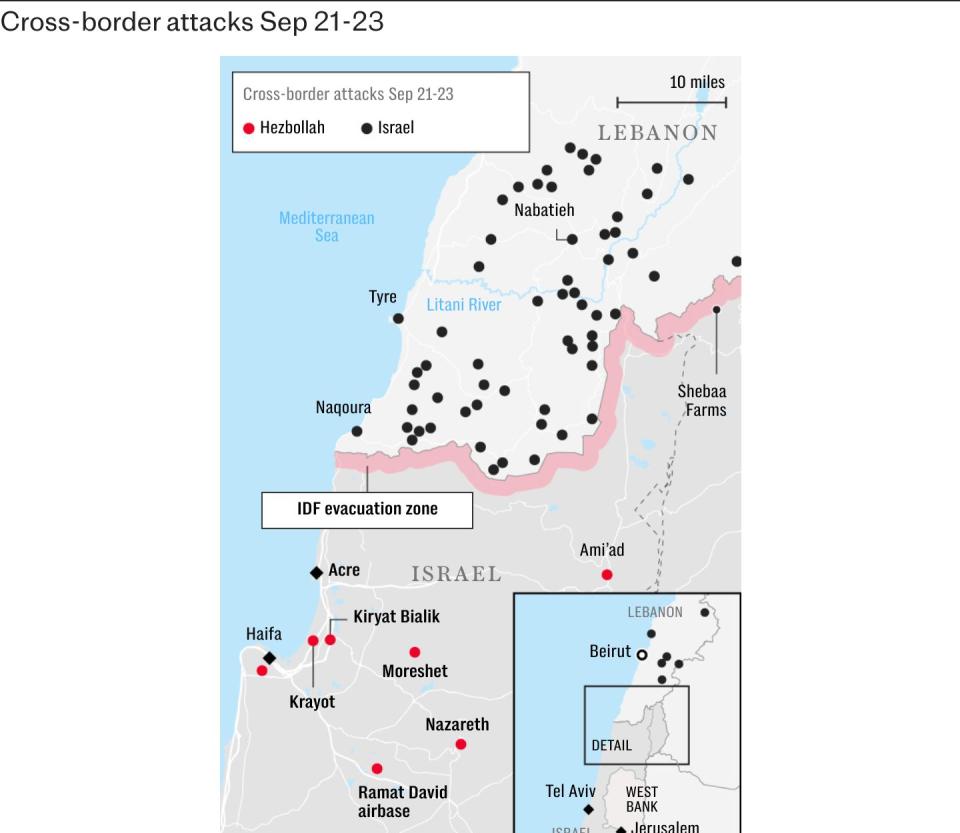
Once a small, tight-knit organisation, Hezbollah has rapidly expanded over the past decade after it sent fighters to participate in the Syrian civil war in support of Bashar al-Assad, the country’s president and a Hezbollah ally.
The larger an organisation, the more exposed it is to espionage, notes Mr Khashan. A deep financial crisis in Lebanon, among the worst in world history for 150 years, has also opened the door to financial inducement within the movement, he adds.
“Poverty in Lebanon became a breeding ground for spies to act on behalf of Israel,” Mr Khashan said.
This is how Israel went after Hezbollah’s chain of command.
Southern commanders
At 10.15am on Jan 8 this year, an Israeli drone hit a small car as it travelled through the Lebanese village of Majdal Selm in the south of the country, about 16 miles from the border with Israel.
The assassination of Wissam al-Tawil was the highest profile since the conflict began following the Oct 7 attacks, and at the time raised fears of a major escalation.
It came only two weeks after Israel had already taken out a top Hamas leader with an airstrike in Beirut, and marked a turning point for Israel beginning to shift focus north – where Hezbollah rockets had been raining down on Israel for months – after heavy fighting on the ground in Gaza.
Footage from the scene showed a vehicle charred grey, pockmarked with tiny holes likely from shrapnel, the result of a precision attack with limited collateral damage.
Months passed until Israel would choose its next target: Talib Sami Abdullah. The exact circumstances of his death were unclear but he appeared to also have been targeted by a drone strike in the rural south.
The killing was significant in decapitating the central unit of the south, facing Israel, where countless rockets had forced so many to flee their homes.
Shifting north
The next to fall was the head of the adjacent southwestern unit.
This time, a drone struck a vehicle in Tyre, Lebanon’s fourth largest city, a gateway between north and south that juts out into the Mediterranean.
Footage from the scene shows a vehicle burning between two modern apartment blocks in a built-up area, a sign Israelis were tracking movement from rural strongholds to the relative safety of urban areas, where the risks for Israel to attack were greater.
But little could have prepared Hezbollah for what came next: an air strike in the middle of the sprawling capital of Beirut.
At the end of the month, an apartment block was severed likely by a missile – likely fired by a F-15, F-16 or F-35 jet – killing Shukr, a founding member of Hezbollah’s armed wing ostensibly in retaliation for a rocket attack that killed 12 children in Israeli-occupied Golan a week earlier.
Experts disagreed on whether the huge blast site and collapsed building was the result of weapons hidden in the building or secondary explosions triggered by utilities.
Beirut
In September, Israel stepped up its targeting of Hezbollah with a wave of suspected sabotage attacks that led to pagers and walkie-talkies exploding.
Analysts believed Mossad was trying to soften Hezbollah for further attacks.
A large IDF air strike followed days later on a residential street in Beirut. Footage showed rubble and wreckage where two more top commanders had been killed.
Experts said the shop fronts blown out in the blast were significant.
Israeli intelligence believes that Hezbollah uses phone and electronics shops underneath civilian homes for weapons storage and safe houses.
Another air strike followed a few days later but failed to kill its target, Ali Karaki, with an attack on what looked to be a basement of a separate residential block.
Karaki had survived a previous assassination attempt too, exposing flaws in Israel’s precision targeting.
All the strikes in Beirut were in the Shia southern suburbs, which are under Hezbollah control, known as Dahieh or Dahiyeh.
Some of the assassinations may have been helped by the suspected Mossad explosives planted in pagers and walkie-talkies of Hezbollah fighters earlier this month.
While the explosives maimed and killed many, they also crippled communications, limiting the group’s bandwidth to talk to each other, and narrowing the options, giving Israel a greater chance to intercept vital messages.

“They are on the move all the time so if we know that one week ago, Israel managed to breach the communications system of Hezbollah then maybe they still have the ability to track them,” Ronen Solomon, an Israeli intelligence analyst, said.
“For Hezbollah to change all their communications is a huge logistical operation so they will still be depending on the communications they’re left with.”
Hezbollah crippled
The decapitation strikes are, of course, only a single, if important, element in Israel’s strategy of countering Hezbollah and fulfilling its war objective of allowing 60,000 residents to return to their homes in the north of the country.
The assassinations would probably not be enough in themselves to deter Hezbollah from firing rockets into northern Israel, which it has been doing in support of Hamas following the start of Israel’s operation in Gaza last October.
There are still a large number of commanders playing important roles who have not been killed, while the Iranian Revolutionary Guard Corps, which forms a part of Hezbollah’s command chain, will help replenish the supply of military leaders, notes Ms Khatib.
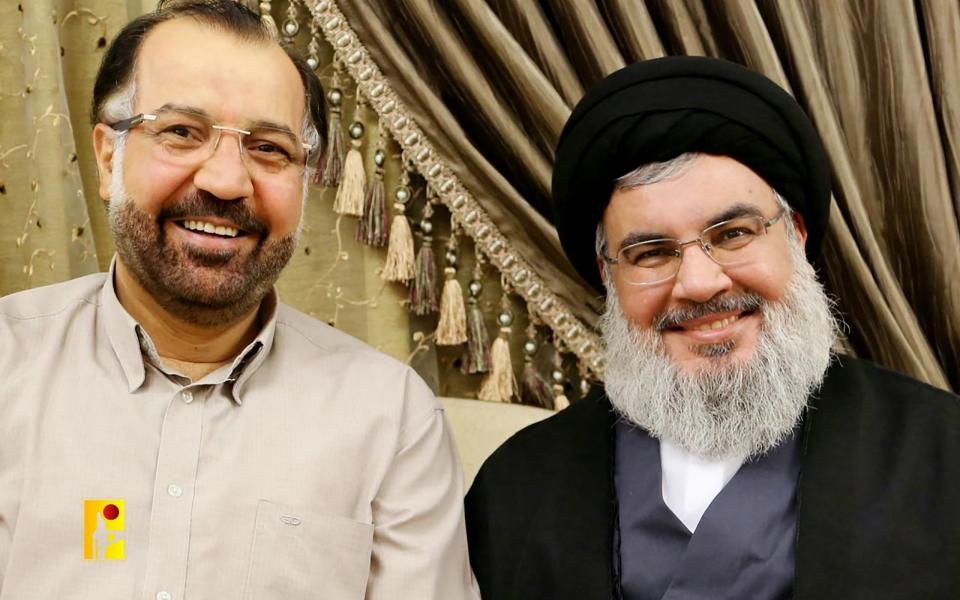
But taken together with the other elements of the Israeli assault, the future of the movement is looking more uncertain than ever before.
“Although Hezbollah right now is far from crumbling, I think it is facing the greatest challenge in its history,” she said.
For a start, Hezbollah will not just be paranoid about spies in its ranks, it will also have lost faith in any form of technology to communicate.
Co-ordinating a missile response to Israeli air strikes or even organising basic logistics is made much more complicated if the only way of communicating is through verbal messaging.
Writing off Hezbollah would certainly be premature. It still has a large arsenal of long-range guided missiles that, if fired in sufficient quantity, could overwhelm Israel’s Iron Dome anti-missile system – which has so far managed to intercept much of the low-grade rocket fire aimed in its direction.
Striking back
Hezbollah fired hundreds of rockets into Israel in the past week, most have been aimed away from population centres, with only a single missile being aimed at Tel Aviv, which was easily intercepted.
The big question is whether Hezbollah will not fire its rockets – or whether, because its capability has been so eroded, it cannot.
Iran, Hezbollah’s paymasters, may be preventing the group from firing its more sophisticated missiles, which it views as an insurance in the event of Israeli strikes on its nuclear facilities.
Meanwhile, those close to Hezbollah say it has chosen not to escalate because its leaders believe that is what Israel wants them to do.

“It [Israel] is … looking to provoke Iran and Hezbollah into an escalation that would allow it to appeal for American intervention. Hezbollah does not wish to walk into that trap,” says Kassem Kassir, a Lebanese commentator close to Hezbollah.
Yet arguments that Hezbollah is no longer able to escalate even if it wished to are increasingly being advanced by experts.
The top-level assassinations aside, the pager and walkie-talkie attacks killed, maimed or otherwise incapacitated so many seasoned senior and mid-level operatives that Hezbollah has seen its military capability to conduct a war greatly reduced, according to some analysts. One Hezbollah source admitted some 1,500 fighters had lost eyesight or limbs.
“Those considered worthy of carrying a pager have mostly been eliminated, meaning that those people running many of Hezbollah’s operations right now are young and inexperienced,” said Mr Khashan, of the American University of Beirut.
The Nasrallah question
The past week has unquestionably humiliated Hezbollah, but it is also possible that the movement has been irreparably damaged and that even if it rebuilds it will be a shadow of its former self.
“I don’t think Hezbollah will be able to recover from this historic loss. It’s not going to be something seen in the near future, but the long-term implications of the damage that has been done to Hezbollah will, I think, be irreversible,” said Ms Khatib.
If Nusrallah is a target now, he is arguably a symbolic one. He is undoubtedly the voice and face of Hezbollah, but he is also a figurehead. Major political and military decisions are taken by executives who answer ultimately to Iran rather than to Nasrallah.
The killing of Nasrallah’s predecessor by Israeli helicopter gunships in 1992 also shows that killing a leader does not necessarily mean crippling the movement he led.
“Nasrallah is a symbol for Lebanese Shi’ites and if Israel wants to put an end to the phenomenon of Hezbollah then they need to eliminate the symbol of the party,” said Hilal Khashan.
End game
One senior Israeli intelligence source, who has been in the service for 30 years, said the recent escalations had opened the door to targeting Hezbollah’s leader.
“In the past, Israel has avoided assassinating Nasrallah, because it’s almost like assassinating the head of a state, and Israel usually shies away from doing things like that. But now it’s a different ball game,” the source said before Friday’s attack on the headquarters in Beirut.
There is a degree to which Israel hopes the current air strikes, assassinations and sabotage operations will be enough to force Hezbollah – and whoever its leader is – to pull its forces back from the border.
A strike on the Beirut headquarters and the possible death of Nasrallah may have put paid to that. Observers may now be questioning if Iran will step in to a wider Middle East war.
EMEA Tribune is not involved in this news article, it is taken from our partners and or from the News Agencies. Copyright and Credit go to the News Agencies, email news@emeatribune.com Follow our WhatsApp verified Channel

